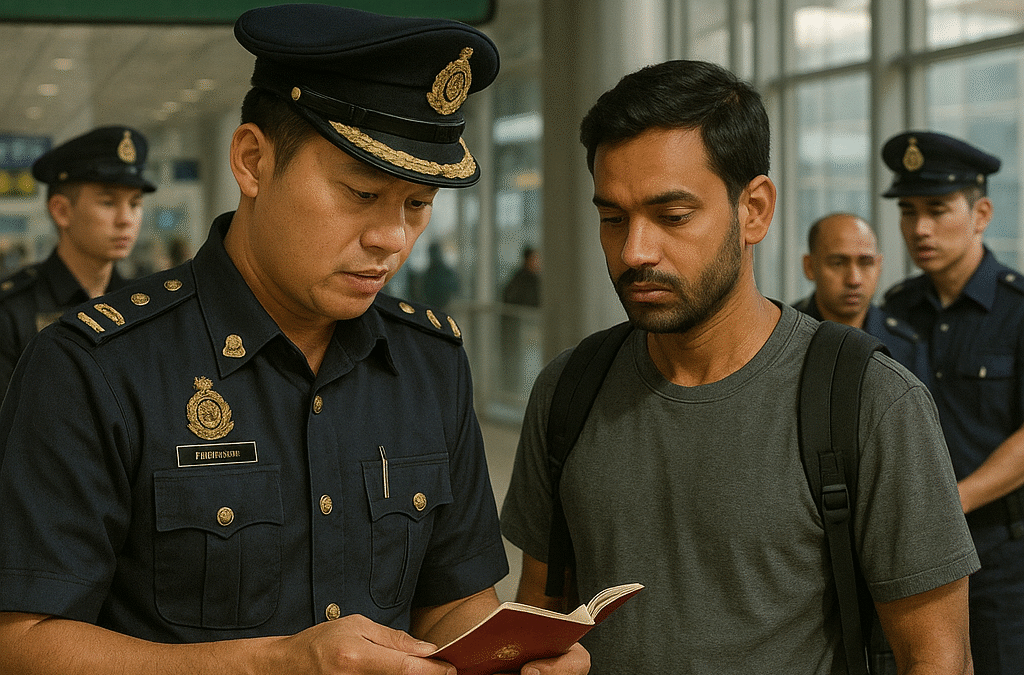In a disturbing series of revelations, reports from Malaysian and international media outlets have confirmed that several Bangladeshi migrants working in Malaysia have been implicated in a transnational network supporting radical Islamic ideology, including connections with ISIS. This has reignited fears surrounding diaspora radicalisation, misuse of labour migration, and the pressing need for stronger counter-extremism strategies both at home and abroad.
The Discovery
According to a report by The Straits Times, Malaysian authorities dismantled an Islamic State (ISIS) cell operating within its territory which included members from Bangladesh, alongside suspects from the Philippines and Malaysia itself. These individuals were reportedly involved in spreading extremist propaganda, fundraising, and attempting to radicalise fellow migrant workers under the radar of authorities (Straits Times, 2025).
The Malaysian Special Branch, supported by cyber-intelligence and covert surveillance, intercepted messages, observed unusual money transfer patterns, and uncovered encrypted digital content that linked the suspects to ISIS’s ideology. The cell was allegedly attempting to recruit other Bangladeshi migrant workers, some of whom were reportedly already ideologically inclined through social media exposure and informal religious gatherings.
Deportation and Sentencing
Following their arrest, several Bangladeshi nationals were deported to Bangladesh. Once repatriated, they were immediately taken into custody by the Rapid Action Battalion (RAB) and presented before Dhaka’s Anti-Terrorism Tribunal.
As reported by The Business Standard, three Bangladeshi returnees have already been sentenced to prison under Bangladesh’s Anti-Terrorism Act after authorities confirmed their direct links to proscribed militant networks (TBS News, 2025). According to RAB officials, the trio had been in regular contact with ISIS operatives in Syria and were allegedly tasked with both recruiting and raising funds among the migrant workforce in Malaysia.
The Rot from Within: Radical Sermons and National Drift
What is perhaps even more alarming is that this external manifestation of extremism is being nourished by dangerous ideological currents festering within Bangladesh itself. The current trajectory of radical preachers, unregulated madrashas, fiery waaj mahfils, and hate-laden khutbas are polluting the minds of youth across the nation. The soft infiltration of radical theology into mainstream social discourse has largely gone unchallenged, especially in rural areas and unmonitored urban peripheries. There is an unmistakable hallmark in the present status quo that suggests governance, or at least its ideological spine, has been overtaken by those sympathetic to or tolerant of fundamentalist agendas. This ideological permissiveness, if not outright complicity, is now seeping into state behaviour, media narratives, and institutional frameworks. Most concerning is the sudden tilt in Bangladesh’s foreign posture—moving closer to Pakistan after decades of maintaining a careful distance since the horrors of 1971. This realignment is not just geopolitical manoeuvring; it reeks of a sinister conjecture in the game of deceit and deception. A Bangladesh subtly co-opted by radical ideologues and guided by Pakistan’s deep-state tacticians poses a mammoth security threat—not just internally, but for the entire South Asian region.
How Did It Happen?
The seduction of radical ideology is neither new nor unique to Bangladeshis abroad, but the scale and method are alarming. A detailed investigation by The Week revealed that many radical recruiters target emotionally vulnerable or financially insecure migrant workers — promising them purpose, honour, and community in the form of “jihad” (The Week, 2025).
Recruiters exploit informal gathering spaces, such as dormitories and local mosques not affiliated with official religious authorities, as well as closed WhatsApp groups. The ideological grooming is slow, often masquerading as harmless religious instruction before escalating into calls for martyrdom or covert support to militant groups overseas.
The Jerusalem Post further highlighted that the funds raised were often sent to shadowy cryptocurrency wallets or moved via informal hundi networks. These methods bypass formal banking channels, making them harder to trace and disrupt (Jerusalem Post, 2025).
Bangladesh’s Domestic Response
Bangladesh’s security apparatus has expressed growing concern over the potential backflow of radicalised individuals who return from foreign labour markets. This is particularly alarming given Bangladesh’s already fragile balance in maintaining religious harmony amidst a global rise in extremism.
Bangladesh’s Home Ministry, in coordination with its intelligence arms and RAB, has begun increasing scrutiny of returning workers from high-risk regions. In addition, counter-radicalisation efforts, including community engagement, digital surveillance, and religious education, are being prioritised.
However, experts caution that reactive deportation and incarceration strategies must be complemented by preventive policies, such as migrant counselling, ideological vetting, and support structures abroad to minimise vulnerability among workers.
Malaysia’s Stand and the Regional Dimension
Malaysia, long known for its multi-ethnic and multi-religious identity, has increasingly taken a zero-tolerance stance on religious extremism. Their counter-terrorism unit, operating under the Royal Malaysia Police, maintains sophisticated intelligence partnerships with regional and Western security agencies.
This incident, while effectively contained, underscores a persistent threat: Southeast Asia is a strategic target for radical Islamist networks seeking soft entry points into larger geopolitical arenas, from Myanmar to the Philippines and now, the migrant corridors of Bangladesh.
The recent exposé by China’s Xinhua News Agency warns that the radicalisation pipeline is not just ideological — it is logistical. Migrants are exploited as fundraisers, couriers, and message relays between global jihadist operations (Xinhua, 2025).
Migrant Labour, Vulnerability, and State Responsibility
This episode demands an uncomfortable introspection. Why are migrant workers, especially Bangladeshis, so susceptible to radicalisation?
The answer lies in a mix of economic desperation, identity crises, poor regulation by Bangladeshi manpower agencies, and lack of cultural reintegration strategies for those returning. Many go abroad with debt burdens, endure exploitative labour conditions, live in isolation, and face religious indoctrination in the absence of community oversight.
Bangladesh’s Expatriates’ Welfare and Overseas Employment Ministry must now grapple with a dual mandate: protecting workers abroad and preventing their ideological corruption. Enhanced pre-departure training, digital monitoring, and religious literacy campaigns are urgently needed.
Conclusion: A Wake-Up Call, Not Just an Incident
The exposure of Bangladeshi migrant involvement in radical Islamist activities in Malaysia is not an isolated event — it is a symptom of deeper, structural vulnerabilities that require immediate and strategic intervention.
This is not merely about criminal justice or deportation; it is about safeguarding the soul of Bangladesh’s migrant workforce — one of the most significant contributors to its GDP. It is about protecting the image of Bangladesh on the world stage and about preventing future acts of terror that could originate from what is today just ideological grooming.
In an age of transnational extremism, complacency is not an option. Vigilance, compassion, policy reform, and international cooperation must become the four pillars upon which Bangladesh builds its fight against radicalisation, both at home and abroad.
References
-
The Straits Times. (2025). Malaysia dismantles Islamic State network involving workers from Bangladesh.
https://www.straitstimes.com/asia/se-asia/malaysia-dismantles-islamic-state-network-involving-workers-from-bangladesh -
The Business Standard. (2025). 3 Bangladeshis sent to jail after deportation from Malaysia over militant ties.
https://www.tbsnews.net/bangladesh/3-bangladeshis-sent-jail-after-deportation-malaysia-over-militant-ties-1181671 -
The Jerusalem Post. (2025). Islamic terrorism and recruitment across labour corridors.
https://www.jpost.com/international/islamic-terrorism/article-860000 -
Xinhua News. (2025). Transnational radicalisation threats among migrant workers.
https://english.news.cn/20250706/22b11f93292147e9b33855d507d5d000/c.html -
The Week. (2025). How ISIS radicalised Bangladeshi expat labourers in Malaysia to recruit terrorists, fund group in Syria.
https://www.theweek.in/news/world/2025/07/04/how-isis-radicalised-bangladeshi-expat-labourers-in-malaysia-to-recruit-terrorists-fund-group-in-syria.html






